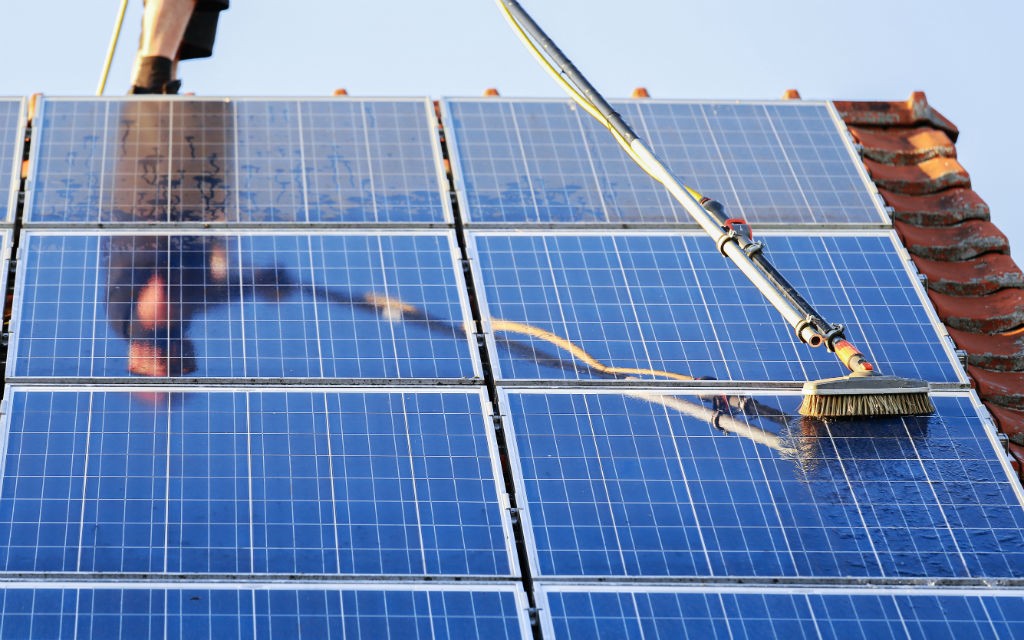Harnessing the power of the sun through solar panels offers a renewable and clean source of energy, significantly reducing our carbon footprint. However, maintaining optimal performance of these panels is crucial to maximize their efficiency and longevity. One essential aspect of this upkeep is regular cleaning to remove dirt, debris, and other particles that can accumulate over time. Understanding the frequency of solar panel cleaning is paramount to ensuring continued efficiency and trouble-free operation.

Image: gridsub.com
Factors Influencing Cleaning Frequency
The optimal frequency for cleaning solar panels depends on various factors, including:
-
Location: Exposure to dust, pollen, and other airborne pollutants varies based on geographical location. Panels in urban or highly industrialized areas require more frequent cleaning compared to those in rural areas with cleaner air.
-
Weather Conditions: Heavy rainfall can wash away loose particles, reducing the need for frequent cleaning. However, areas with high humidity or proximity to coastal areas may necessitate more frequent cleaning due to salt accumulation and increased corrosion risk.
-
Type of Solar Panels: Different types of solar panels have varying levels of susceptibility to dirt and debris accumulation. Monocrystalline panels, known for their superior efficiency, have a smoother surface that repels dirt better than polycrystalline panels.
-
Surrounding Vegetation: Trees and shrubs near solar panels can shed leaves, pollen, and other organic debris, increasing the frequency of cleaning required.
-
Slope of Installation: Panels installed at steeper angles are less prone to dirt buildup, as rain and wind tend to wash away particles more effectively.
Recommended Cleaning Frequency
Based on these factors, here’s a general guide to the recommended frequency of solar panel cleaning:
-
Urban or Highly Industrialized Areas: Quarterly cleaning or more frequently if heavy pollution or debris accumulation is observed.
-
Rural Areas with Moderate Pollution: Semi-annual cleaning is typically sufficient.
-
Coastal Areas: Monthly cleaning or even more frequent, depending on salt buildup and corrosion risk.
-
Steeper Installations or Monocrystalline Panels: Annual or bi-annual cleaning may be adequate in less polluted areas.
-
Surrounded by Vegetation: Quarterly cleaning or more frequently during seasons with heavy shedding.
Benefits of Regular Solar Panel Cleaning
Regular cleaning of solar panels offers numerous benefits, including:
-
Maintains Optimal Performance: Dirt and debris accumulation can block sunlight from reaching the photovoltaic cells, reducing energy production. Regular cleaning ensures maximum efficiency and power output.
-
Extends Panel Lifespan: Corrosion and other damage caused by accumulated particles can shorten the lifespan of solar panels. Timely cleaning prevents such damage, extending their durability.
-
Prevents Overheating: Dirt buildup can trap heat, leading to overheating of the panels and reducing their efficiency. Regular cleaning helps maintain optimal operating temperatures.
-
Enhanced Safety: Accumulation of combustible debris, such as leaves and twigs, on solar panels poses a fire hazard. Cleaning eliminates such risks, ensuring safety.
-
Avoids Warranty Issues: Many solar panel manufacturers require regular cleaning as part of their warranty conditions. Neglecting proper cleaning may void warranties, limiting coverage for repairs or replacements.

Image: www.solarrepairservice.com.au
How Often Do You Need To Clean Solar Panels
Tips for Effective Solar Panel Cleaning
-
Use soft brushes or sponges and avoid abrasive materials that can scratch the panels.
-
Use mild soap or a dedicated solar panel cleaning solution; avoid harsh detergents or chemicals.
-
Clean early in the morning or late in the evening when the panels are cool to prevent water spots.
-
Rinse thoroughly with clean water to remove all soap residue.
-
Allow panels to dry completely before reconnecting the system.
By adhering to the recommended cleaning frequency and following these tips, you can keep your solar panels in optimal condition, maximizing their efficiency and lifespan while enjoying the benefits of clean, renewable energy for years to come.